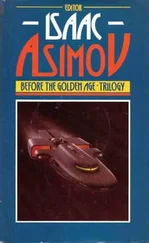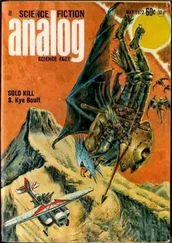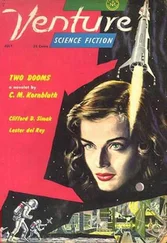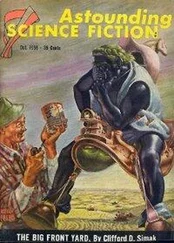Clifford Simak - The Werewolf Principle
Здесь есть возможность читать онлайн «Clifford Simak - The Werewolf Principle» весь текст электронной книги совершенно бесплатно (целиком полную версию без сокращений). В некоторых случаях можно слушать аудио, скачать через торрент в формате fb2 и присутствует краткое содержание. Жанр: Фантастика и фэнтези, на английском языке. Описание произведения, (предисловие) а так же отзывы посетителей доступны на портале библиотеки ЛибКат.
- Название:The Werewolf Principle
- Автор:
- Жанр:
- Год:неизвестен
- ISBN:нет данных
- Рейтинг книги:3 / 5. Голосов: 1
-
Избранное:Добавить в избранное
- Отзывы:
-
Ваша оценка:
- 60
- 1
- 2
- 3
- 4
- 5
The Werewolf Principle: краткое содержание, описание и аннотация
Предлагаем к чтению аннотацию, описание, краткое содержание или предисловие (зависит от того, что написал сам автор книги «The Werewolf Principle»). Если вы не нашли необходимую информацию о книге — напишите в комментариях, мы постараемся отыскать её.
The Werewolf Principle — читать онлайн бесплатно полную книгу (весь текст) целиком
Ниже представлен текст книги, разбитый по страницам. Система сохранения места последней прочитанной страницы, позволяет с удобством читать онлайн бесплатно книгу «The Werewolf Principle», без необходимости каждый раз заново искать на чём Вы остановились. Поставьте закладку, и сможете в любой момент перейти на страницу, на которой закончили чтение.
Интервал:
Закладка:
DR LUKAS: Well, not quite that sweeping, senator. Not any condition. Eventually, perhaps, but not now. And there would, of course, be certain conditions which would be entirely incompatible with life of any sort.
SENATOR STONE: But a form of human life could be created which would exist under a number of conditions which at the moment would prohibit human life as we know it.
DR LUKAS: I think that can stand as a fair statement.
SENATOR STONE: Then let me ask you, doctor… if such a life form were created, would it still be human?
DR LUKAS: It would be based, so far as possible, upon the biological and intellectual pattern of a human being. This would be necessary. You have to have a starting point.
SENATOR STONE: Would it look like a human being?
DR LUKAS: In many cases, it would not.
SENATOR STONE: In most cases, perhaps. Wouldn't that be right, doctor?
DR LUKAS: It would depend entirely upon the severity of the environmental parameters which would have to be met.
SENATOR STONE: In some cases, it would be a monster, would it not?
DR LUKAS: Senator, you will have to define your terms. What is a monster?
SENATOR STONE: All right, then. Let us say a monster is a life form that would be repugnant for a human being to look upon. A life form in which a human being could see no relationship to himself. A life form, confronted with which, a human might find himself terrified or horrified or filled with loathing and disgust.
DR LUKAS: Whether a man would be filled with loathing and disgust would depend, to a large extent, upon what kind of man he was. With the proper attitude…
SENATOR STONE: Let us forget about the proper attitude. Let us take an ordinary man or woman, any one of the people sitting in this room. Might certain people look upon this hypothetical creation of yours and feel loathing and disgust?
DR LUKAS: I suppose some of them would. And I want to correct you, senator. You say monster. This is not my monster. It is something you have conjured up…
SENATOR STONE: But some human beings would regard such a creature as a monster?
DR LUKAS: Some of them.
SENATOR STONE: Many of them, perhaps.
DR LUKAS: Yes. Perhaps many of them.
SENATOR STONE: Thank you, doctor. I believe that is all the questions that I have.
SENATOR HORTON: Now, Dr Lukas, let's take a little further look at this synthetic man I know that description is not entirely right, but I think it may please my colleague.
SENATOR STONE: A synthetic man, yes. Not a human being. What this so-called bioengineering proposal calls for is to colonize other planets, not with human beings, but with synthetic creatures which would bear no resemblance to human beings. In other words, to release upon the galaxy, a horde of monsters…
SENATOR HORTON Well now let's see, Dr Lukas let you and me agree with Senator Stone that such a creature might be fairly horrible to look upon. But how it might look would seem to me to be beside the question. What is important is what it is. Do you agree?
DR LUKAS Most emphatically sir.
SENATOR HORTON: Aside from how it might look, would you say it still would be a human being?
DR LUKAS: Yes, senator, I would. Its bodily structure would bear no relationship to what it would be. Its identity would rest within its brain and mind, its motivations and its intellectual outlook.
SENATOR HORTON: And its brain would be a human brain?
DR LUKAS: Yes, sir.
SENATOR HORTON: Therefore its emotions and motivations and outlook would conform to the human framework?
DR LUKAS: Certainly they would.
SENATOR HORTON: Therefore, it would be human. No matter what its form, it still would be human.
DR LUKAS: Yes, human.
SENATOR HORTON: Doctor, to your knowledge, has such a creature ever been made? By creature, I mean, of course, a synthetic human.
DR LUKAS: Yes. A matter of two hundred years ago or so. Two of them were made. But there was a difference…
SENATOR STONE: Just a minute, there! Are you referring to that old myth we hear occasionally…
DR LUKAS: Senator, it is not a myth.
SENATOR STONE: Have you documentation to back up your statement?
DR LUKAS: No, sir.
SENATOR STONE: What do you mean — no, sir? How can you come before this hearing and make a statement that you can't backup?
SENATOR HORTON: I can back it up. At the proper time I shall place the necessary documents in evidence.
SENATOR STONE: Perhaps, then, the senator should be sitting where the witness is.
SENATOR HORTON: Not at all. I'm perfectly satisfied with this witness. You say, sir, that there was a difference…
SENATOR STONE: Just a moment, there! I object! I do not think this witness is competent.
SENATOR HORTON: Well, let's find out. Dr Lukas, under what circumstances did you come upon this information?
DR LUKAS: About ten years ago, when I was doing some research for a paper, I applied for clearance to have access to certain records in Space Administration. You see, senator, I was following up what you call a myth. Not many people knew of it, but I had heard of it and wondered if it might not be more than a myth. So I applied for a clearance…
SENATOR HORTON: And you were given clearance?
DR LUKAS: Well, not right away, Space Administration was — well, you might call it reluctant. So finally I took the tack that in a matter a good two centuries old, no clearance was needed. That it no longer was a matter of clearance, but a matter of historical record. I don't mind telling you that I had a rough time making anyone see the logic of my argument.
SENATOR HORTON: But you finally prevailed?
DR LUKAS: Yes, finally. With considerable competent assistance, I might add. You see, the records at one time had been under the highest top security such material could be given. Technically, this security still applied. It took considerable argument to make it apparent that such a situation was ridiculous…
SENATOR STONE: Now, hold up a minute, doctor. Before you go on, one question. You said you had assistance.
DR LUKAS: Yes, I did.
SENATOR STONE: Could a considerable part of that assistance have come from Senator Horton?
SENATOR HORTON: Since the question concerns me, I'll answer if Dr Lukas will consent. I am quite happy to admit that I did lend him some assistance.
SENATOR STONE: All right, that's all I wanted. Just so it's on the record.
SENATOR HORTON: Dr Lukas, if you'll please continue.
DR LUKAS: The records showed that two hundred and twenty-one years ago — 2266, to be exact — two synthetic beings had been made. They were in the shape of humans and they had human minds, but they were constructed for a very special purpose. They were to be used in initial contacts with life on other planets, to be carried aboard exploratory and survey ships and used to gather data on the dominant life on whatever new planets might be found.
SENATOR HORTON: Now, Dr Lukas, without going into details at the present moment, can you tell us exactly how it was planned they were to do this sort of job?
DR LUKAS: I'm not sure I can make myself entirely clear, but I'll try. These synthetic humans were highly adaptable. You might have described them, for want of a better term, as plastic. The concept of open-endedness was employed — it couldn't have been developed earlier than ten years or so before, and it is unusual, to say the least, to find a concept as intricate as this bent to practical purpose in such a length of time. All the basic components of the constructed human bodies involved open-endedness — completed, you understand, and yet, in a sense, essentially incomplete. The amino acids…
SENATOR HORTON: Perhaps, for the moment, you will only tell us what these bodies were intended to do, without going into the principles involved.
Читать дальшеИнтервал:
Закладка:
Похожие книги на «The Werewolf Principle»
Представляем Вашему вниманию похожие книги на «The Werewolf Principle» списком для выбора. Мы отобрали схожую по названию и смыслу литературу в надежде предоставить читателям больше вариантов отыскать новые, интересные, ещё непрочитанные произведения.
Обсуждение, отзывы о книге «The Werewolf Principle» и просто собственные мнения читателей. Оставьте ваши комментарии, напишите, что Вы думаете о произведении, его смысле или главных героях. Укажите что конкретно понравилось, а что нет, и почему Вы так считаете.









